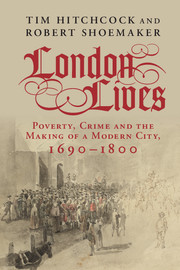Book contents
- Frontmatter
- Dedication
- Contents
- List of figures
- Preface
- Acknowledgements
- List of abbreviations
- 1 Introduction
- 2 Beggarman, thief: 1690–1713
- 3 Protest and resistance: 1713–1731
- 4 Vestries, justices and their opponents: 1731–1748
- 5 Reformers and their discontents: 1748–1763
- 6 Finding a voice: 1763–1776
- 7 The state in chaos: 1776–1789
- 8 Epilogue: The 1790s
- Bibliography
- Index
- References
8 - Epilogue: The 1790s
Published online by Cambridge University Press: 05 December 2015
- Frontmatter
- Dedication
- Contents
- List of figures
- Preface
- Acknowledgements
- List of abbreviations
- 1 Introduction
- 2 Beggarman, thief: 1690–1713
- 3 Protest and resistance: 1713–1731
- 4 Vestries, justices and their opponents: 1731–1748
- 5 Reformers and their discontents: 1748–1763
- 6 Finding a voice: 1763–1776
- 7 The state in chaos: 1776–1789
- 8 Epilogue: The 1790s
- Bibliography
- Index
- References
Summary
Lives
Thomas Limpus, with whom this book began, spent the 1790s in Australia. While attempts in the previous decade to transport him and others ‘beyond the seas’ – to Africa, revolutionary America, Canada and Honduras – had been stopgap and incompetent measures that collapsed in the face of plebeian resistance and settler opposition, his transportation to Australia was permanent. Sheer distance, combined with military power, limited indigenous opposition and a colonialist agenda that placed a new positive value on his life and labour, ensured that he would stay put. He died on Norfolk Island sometime before 1801.
Many of the other men and women who had stymied the best efforts of the judicial establishment over the course of the 1770s and 1780s also ended their lives in Australia. Robert Sideaway had been first convicted and sentenced to the hulks soon after Thomas Limpus in 1778. Like Limpus, he was later charged with returning from transportation, in his case following a daring escape from Newgate prison dressed in women’s clothes. Despite his counsel’s attempt to secure his release on a technicality, Sideaway was transported on the First Fleet. He went on to establish a successful bakery, and opened Australia’s first theatre in 1796. He died there in 1809. So did Mary Burgess, whom the clerk at the Home Office described as: ‘5 f[oot] 4 in[ches, with] Grey Eyes, Brown hair [and a] Sallow Complexion’. In the spring and summer of 1789, she had been one of the men and women who had publicly challenged the court at the Old Bailey by refusing the royal pardon. Following an escape from her transport ship, the Lady Juliana, the night before it was due to weigh anchor, she spent the next three years selling old clothes in Petticoat Lane before she was finally recaptured. She arrived in Australia on 4 October 1794.
- Type
- Chapter
- Information
- London LivesPoverty, Crime and the Making of a Modern City, 1690–1800, pp. 394 - 413Publisher: Cambridge University PressPrint publication year: 2015



